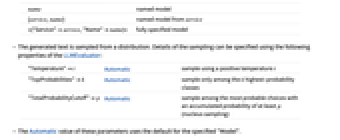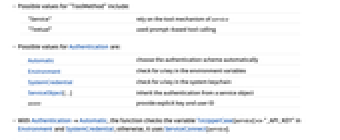represents an ongoing conversation with a remote service.
ChatObject[init]
creates a new chat using the initialization init.
ChatObject[…][prop]
extracts the property prop from the object.


ChatObject
represents an ongoing conversation with a remote service.
ChatObject[init]
creates a new chat using the initialization init.
ChatObject[…][prop]
extracts the property prop from the object.
Details and Options







- ChatObject stores a full conversation together with the message metadata.
- The initialization init can take the following values:
-
"text" static text LLMPrompt["name"] a repository prompt StringTemplate[…] templated text TemplateObject[…] template for creating a prompt Image[…] an image {prompt1,…} a list of prompts {msg1,…} a list of messages - Non-message init values are converted to messages with "Role""System".
- Template objects are automatically converted to message content via TemplateObject[…][].
- Prompt created with TemplateObject can contain text and images. Not every LLM supports image input.
- When the initialization is a list of messages, each message must be an association with the following keys:
-
"Content" content content of the message "Role" String role of the participant "Timestamp" DateObject message timestamp (optional) - Possible form of content are:
-
"text" a string Image[…] an image object <|"Type""Text","Data"data|> an explicit text part <|"Type""Image","Data"data|> an explicit image part (supports File[…] objects) {content1,…} multiple part content - Possible values for "Role" include:
-
"Assistant" LLM-generated message "System" system message "Tool" autogenerated tool response "User" user message - The following options can be specified:
-
Authentication Automatic explicit user ID and API key LLMEvaluator $LLMEvaluator LLM configuration to use - LLMEvaluator can be set to an LLMConfiguration object or an association with any of the following keys:
-
"MaxTokens" maximum amount of tokens to generate "Model" base model "PromptDelimiter" string to insert between prompts "Prompts" initial prompts or LLMPromptGenerator objects "StopTokens" tokens on which to stop generation "Temperature" sampling temperature "ToolMethod" method to use for tool calling "Tools" list of LLMTool objects to make available "TopProbabilities" sampling classes cutoff "TotalProbabilityCutoff" sampling probability cutoff (nucleus sampling) - Valid forms of "Model" include:
-
name named model {service,name} named model from service <|"Service"service,"Name"name|> fully specified model - The generated text is sampled from a distribution. Details of the sampling can be specified using the following properties of the LLMEvaluator:
-
"Temperature"t Automatic sample using a positive temperature t "TopProbabilities"k Automatic sample only among the k highest-probability classes "TotalProbabilityCutoff"p Automatic sample among the most probable choices with an accumulated probability of at least p (nucleus sampling) - The Automatic value of these parameters uses the default for the specified "Model".
- Possible values for "ToolMethod" include:
-
"Service" rely on the tool mechanism of service "Textual" used prompt-based tool calling - Possible values for Authentication are:
-
Automatic choose the authentication scheme automatically Environment check for a key in the environment variables SystemCredential check for a key in the system keychain ServiceObject[…] inherit the authentication from a service object assoc provide explicit key and user ID - With AuthenticationAutomatic, the function checks the variable ToUpperCase[service]<>"_API_KEY" in Environment and SystemCredential; otherwise, it uses ServiceConnect[service].
- When using Authenticationassoc, assoc can contain the following keys:
-
"ID" user identity "APIKey" API key used to authenticate - Properties of a chat object can be extracted using ChatObject[…][prop].
- Possible values for prop include:
-
"ChatID" the unique ID of the conversation "FullText" string representation of the conversation "LLMEvaluator" the stored LLMConfiguration "MessageGrid" typeset grid of the conversation "Messages" a list of exchanged messages "Properties" a list of all the possible properties "Usage" cumulative API usage (calls, tokens, …) {prop1,…} a list of properties

Examples
open all close allBasic Examples (2)
Scope (5)
See Also
ChatEvaluate LLMSynthesize LLMConfiguration LLMPrompt LLMPromptGenerator LLMTool LLMResourceTool
Service Connections: OpenAI Anthropic GoogleGemini AlephAlpha Cohere DeepSeek Groq MistralAI TogetherAI
Related Guides
Text
Wolfram Research (2023), ChatObject, Wolfram Language function, https://reference.wolfram.com/language/ref/ChatObject.html (updated 2025).
CMS
Wolfram Language. 2023. "ChatObject." Wolfram Language & System Documentation Center. Wolfram Research. Last Modified 2025. https://reference.wolfram.com/language/ref/ChatObject.html.
APA
Wolfram Language. (2023). ChatObject. Wolfram Language & System Documentation Center. Retrieved from https://reference.wolfram.com/language/ref/ChatObject.html
BibTeX
@misc{reference.wolfram_2025_chatobject, author="Wolfram Research", title="{ChatObject}", year="2025", howpublished="\url{https://reference.wolfram.com/language/ref/ChatObject.html}", note=[Accessed: 15-February-2026]}
BibLaTeX
@online{reference.wolfram_2025_chatobject, organization={Wolfram Research}, title={ChatObject}, year={2025}, url={https://reference.wolfram.com/language/ref/ChatObject.html}, note=[Accessed: 15-February-2026]}